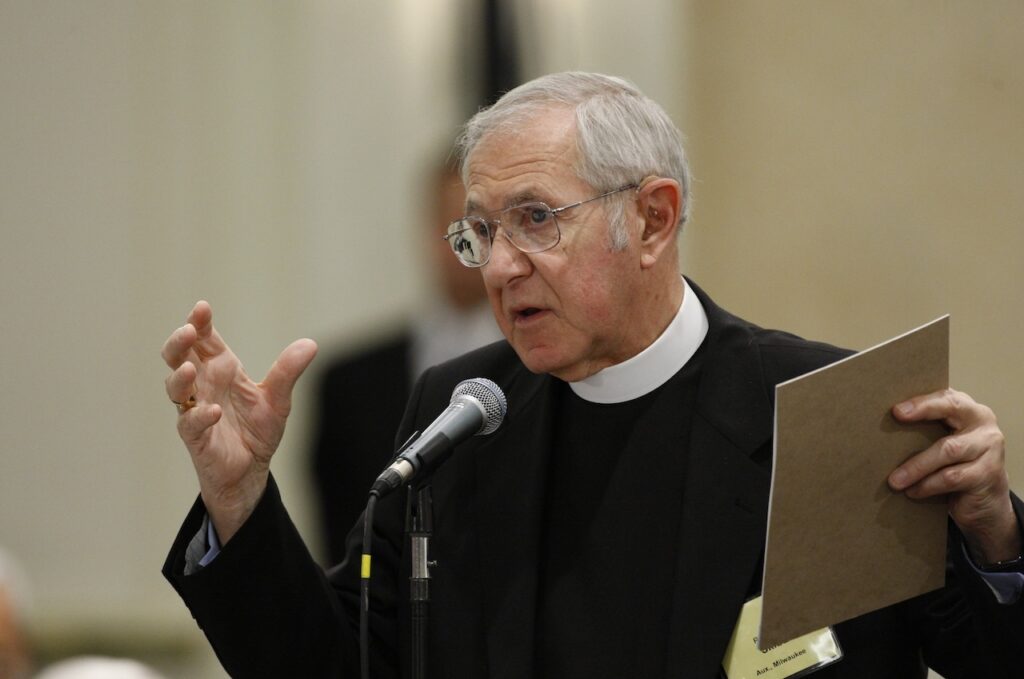(OSV News) — With “heavy hearts,” officials of the Archdiocese of Milwaukee announced Nov. 21 that retired Auxiliary Bishop Richard J. Sklba of Milwaukee “died peacefully in his sleep overnight. May he rest in peace.” He was 89.
“He always had a love for the Archdiocese of Milwaukee and generously spent his life in service,” Archbishop Jerome E. Listecki said in a statement. “Bishop Sklba was a gentleman, a scholar and always a true Christian.”
Ordained to the priesthood in Rome for the Archdiocese of Milwaukee in 1959, he became one of the youngest bishops in the United States when he was ordained as an auxiliary bishop for the Wisconsin archdiocese in December 1979 at age 44. He also served for many years as vicar general of the archdiocese.
Bishop Sklba, who was a biblical scholar and worked to build connections among religious faiths, retired in 2010; he submitted his resignation to the pope at age 75, as required by canon law. He continued to serve the archdiocese in retirement.
A funeral Mass for Bishop Sklba will be celebrated Dec. 4 at the Cathedral of St. John the Evangelist in Milwaukee following visitation. Burial will be in the cathedral crypt immediately following the Mass.
Richard John Sklba was born in Racine, Wisconsin, Sept. 11, 1935. He studied at the Pontifical Gregorian University in Rome from 1954 to 1960, earning an undergraduate degree in philosophy and a graduate degree in theology.
After his ordination to the priesthood, he served two years as an assistant pastor at St. Mary’s Parish in Elm Grove, then returned to Rome in 1962 for three more years of study. He earned the equivalent of an advanced master’s degree in sacred Scripture at the Pontifical Biblical Institute and the equivalent of a doctoral degree in biblical studies at the Pontifical University of St. Thomas of Aquinas, also known as the Angelicum.
He was at St. Peter’s Basilica for the opening session of the Second Vatican Council on Oct. 11, 1962.
After returning to the United States, he spent the next 11 years teaching Scripture at St. Francis de Sales Seminary in Milwaukee, serving at St. Veronica’s Parish there on weekends. In 1976, he was appointed rector of the seminary by the late Archbishop William Cousins of Milwaukee.
Before his retirement, he served for 30 years on various committees of the U.S. Conference of Catholic Bishops including priestly life and ministry, doctrine, liturgy, permanent diaconate, and marriage and family. He chaired the bishops’ subcommittee on the review of Scripture translations from 1991 to 2001.
Bishop Sklba also chaired the bishops’ Committee for Ecumenical and Interreligious Affairs from 2005 to 2008. As chairman he introduced leaders from various faiths – including Jewish, Muslim, Buddhist, Hindu and Jain – to Pope Benedict XVI during the pontiff’s U.S. visit in April 2008.
Beginning in 1998, he co-chaired the national Lutheran-Catholic dialogue for many years. In February 2006, he attended the ninth general assembly of the World Council of Churches in Porto Alegre, Brazil, as a member of the Vatican delegation. He also attended many national meetings of Protestant churches and was involved in projects with Jewish scholars to promote interreligious understanding.
Bishop Sklba had been a member of the Catholic Biblical Association of America since 1968, serving as president in 1982. He participated in several archaeological expeditions to Israel.
His other professional memberships included the Catholic Theological Society of America and the Society for Biblical Literature. Bishop Sklba also published articles, books, papers and occasional book reviews. In 1988, he received CTSA’s John Courtney Murray Award.
For many years he remained active in areas of catechetical formation throughout the 10 counties of the Milwaukee Archdiocese and taught Scripture at Sacred Heart School of Theology, Hales Corners, from 2006 to 2009. He also wrote a column for the Catholic Herald, Milwaukee’s archdiocesan news outlet.
In 2010, when he retired, Bishop Sklba expressed gratitude for the opportunity to serve the Church as a bishop. His “continuing prayer,” he said, was “simply ‘Marana Tha/Come Lord Jesus’ into every aspect of the Church’s mission and life so God may be glorified and the world truly transformed by God’s healing grace.”
“These years have not always been easy, but they have inevitably offered many experiences of God’s loving mercy, grace and growth,” Bishop Sklba said in a statement.
To have lived “in the empowering spirit” of Vatican II on one hand, he said, and on the other “to have experienced personally the profound sorrows of the Church from the effects of the abuse of our children and youth, has been a deep and painful immersion into the Lord’s paschal mystery.”
“Through it all we know that our God is always and ever an almighty source of healing and new beginnings,” he added.
He praised priests as “good and faithful brothers,” the laity as “wise and generous” and parishes as “vital communities.”

